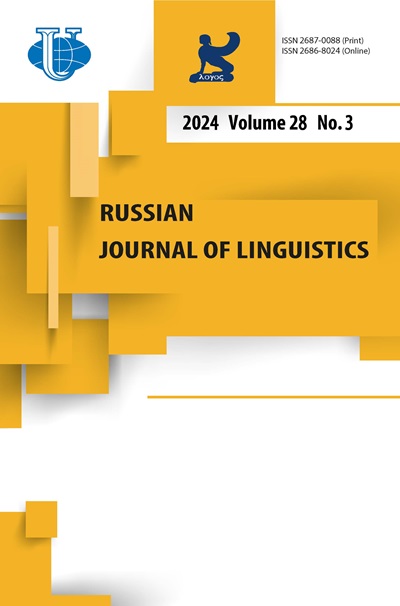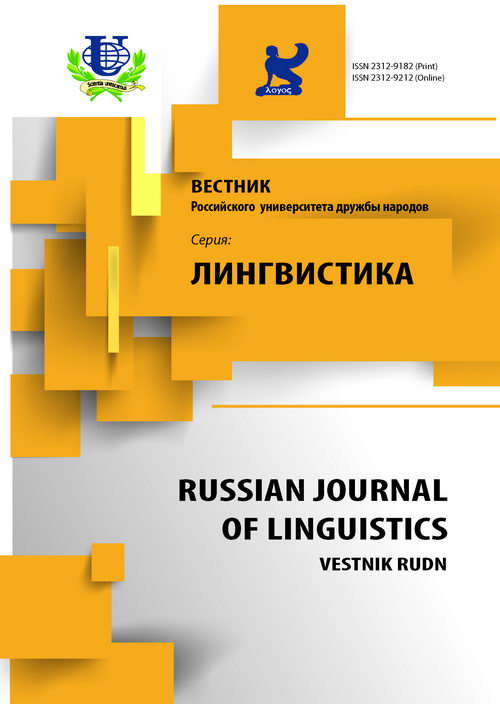Стратегии вежливости в электронных письмах студентов
- Авторы: Зохре Ислами Р -1, Вэй-Хонг Ко -1
-
Учреждения:
- Педагогический колледж Техасского университета A&M
- Выпуск: Том 19, № 4 (2015)
- Страницы: 111-126
- Раздел: Статьи
- URL: https://journals.rudn.ru/linguistics/article/view/9262
Цитировать
Полный текст
Аннотация
Цель настоящей работы - изучение с позиций теории вежливости электронных писем англоязычных и неанглоязычных студентов магистратуры, отправляющих задания своим преподавателям, и выявление различий в стратегиях вежливости в данном речевом акте. Теоретическую основу исследования составили теория вежливости Браун и Левинсона (1987) и теория достижения взаимопонимания (Spencer-Oatey2002, 2008). Материалом исследования послужили 105 писем сорока англоязычных и неанглоязычных студентов. Опираясь на метод анализа речевых актов (Merrison, Wilson, Davies, &Haugh, 2012), мы рассматривали как основной речевой акт подачи задания, так и вспомогательные элементы письма - вступление, так называемый small talk и завершающие фразы. Наше исследование показало, что, несмотря на представление о том, что компьютерные технологии ограничивают возможности межличностного общения (Duthler 2006), помимо основного речевого акта, студенты широко использовали вспомогательные структурные элементы письма для передачи межличностных отношений.
Об авторах
- Зохре Ислами Р
Педагогический колледж Техасского университета A&M
Email: zeslami@tamu.edu
Кафедра преподавания, обучения и культуры
- Вэй-Хонг Ко
Педагогический колледж Техасского университета A&M
Email: shaun37@tamu.edu
Кафедра преподавания, обучения и культуры
Список литературы
- Androutsopoulos, J. (2006). Introduction: Sociolinguistics and computer-mediated communication. Journal of Sociolinguistics, 10, 419-438. doi: 10.1111/j.1467-9841.2006.00286.x.
- Bayraktaroglu, A. (1991). Politeness and interactional imbalance. International Journal of the Sociology of Language, 92, 5-34.
- Bickmore, T., & Cassell, J. (1999). Small talk and conversational storytelling in embodied interface agents. In Proceedings of the AAAI Fall Symposium on Narrative Intelligence.
- Biesenbach-Lucas, S. (2007). Students writing emails to faculty: An examination of e-politeness among native and non-native speakers of English. Language Learning & Technology, 11, 59-81.
- Bjorge, A.K. (2007). Power distance in English lingua franca email communication1. International Journal of Applied Linguistics, 17, 60-80.
- Bou-Franch, P. (2006). Solidarity and deference in computer-mediated communication: A discourse-pragmatic analysis of students’ emails to lecturers. In P. Bou-Franch (Ed.), Ways into discourse (pp. 61-79). Granada, Spain: Comares.
- Bou-Franch, P., & Lorenzo-Dus, N. (2008). Natural versus elicited data in cross-cultural speech act realisation: The case of requests in peninsular Spanish and British English. Spanish in Context, 5, 246-277.
- Bou-Franch, P. (2011). Openings and closings in Spanish email conversations. Journal of Pragmatics, 43, 1772-1785.
- Brown, P., & Levinson, S.C. (1987). Politeness: Some universals in language usage Cambridge University Press.
- Chalak, A., Eslami, Z. & Eslami-Rasekh, A. (2010). Communication strategies and topics in e-mail interactions between Iranian students and their instructors. International Journal of Language Studies, 4, 373-391.
- Chen, C. (2006). The development of e-mail literacy: From writing to peers to writing to authority figures. Language Learning & Technology, 10, 35-55.
- Crystal, D. (2001). Language and the Internet. Cambridge, England: Cambridge University Press.
- Darics, E. (2010). Politeness in computer-mediated discourse of a virtual team. Journal of Politeness Research, 6, 129-150. doi: 10.1515/jplr.2010.007.
- Duthler, K.W. (2006). The politeness of requests made via email and voicemail: Support for the hyperpersonal model. Journal of Computer-Mediated Communication, 11, 500-521. doi: 10.1111/j.1083-6101.2006.00024.x.
- Economidou-Kogetsidis, M. (2011). “Please answer me as soon as possible”: Pragmatic failure in non-native speakers’ e-mail requests to faculty. Journal of Pragmatics, 43, 3193-3215. doi: http://dx.doi.org/10.1016/j.pragma.2011.06.006.
- Felix-Bradsdefer, J.C. (2012). E-mail requests to faculty: E-politeness and internal modification. In H. Woodfield & M. Economidou-Kogetsidis (Eds.), Interlanguage request modification (pp. 87-118). Amsterdam: John Benjamins Publishing Company.
- Formentelli, M. (2009). Address strategies in a British academic setting. Pragmatics, 19, 179-96.
- Islami, Z.R. (2005). Invitations in Persian: Ostensible or genuine? Intercultural Pragmatics Journal, 2(4),453-480. doi: 10.1515/iprg.2005.2.4.453.
- Eslami, Z.R. (2013). Online communication and students’ pragmatic choices in English. Lodz Papers in Pragmatics, 9, 71-92.
- Gains, J. (1999). Electronic Mail-A new style of communication or just a new medium?: An investigation into the text features of E-mail. English for Specific Purposes, 18, 81-101. doi: http://dx.doi.org/10.1016/S0889-4906(97)00051-3.
- Gimenez, J. (2006). Embedded business emails: Meeting new demands in international business communication. English for Specific Purposes, 25, 154-172. doi: http://dx.doi.org/10.1016/ j.esp.2005.04.005.
- Gimenez, J.C. (2000). Business e-mail communication: Some emerging tendencies in register. English for Specific Purposes, 19, 237-251. doi: http://dx.doi.org/10.1016/S0889-4906(98)00030-1.
- Goffman, E. (1967). Interaction ritual: Essays on face-to-face behavior. New York, NY: Anchor Books.
- Gu, Y. (1990). Politeness phenomena in modern Chinese. Journal of Pragmatics, 14, 237-257. doi: http://dx.doi.org/10.1016/0378-2166(90)90082-O.
- Harrison, S. (2000). Maintaining the virtual community: Use of politeness strategies in an e-mail discussion group. In L. Pemberton & S. Shurville (Eds.), Words on the web: Computer mediated communication (pp. 69-78). Exter, UK: Intellect.
- Hartford, B., & Bardovi-Harlig, K. (1996). "At your earliest convenience:' A study of written student requests to faculty. In L. Bouton (Ed.), Pragmatics and Language Learning (pp. 55-69), Urbana Champaign, IN.
- Herring, S. (1996). Two variants of an electronic message schema. In S. Herring Ed.), Computer-Mediated Communication: Linguistic, Social and Cross-Cultural Perspectives (pp. 81-106). Amsterdam, Netherlands: John Benjamins.
- Herring, S. 2007. A faceted classification scheme for computer-mediated discourse. Language@internet.
- Hossjer, E. (2013). Small talk, politeness and email communication in the workplace. In S. Herring, D. Stein & T. Virtanen (Eds.), Pragmatics of computer-mediated communication. Boston, MA: de Gruyter Mouton.
- Hofstede, G. (2001). Culture’s consequences: International differences in work-related values. Beverly Hills, CA: Sage.
- Jessmer, S., & Anderson, D. (2001). The effect of politeness and grammar on user perceptions of electronic mail. North American Journal of Psychology, 3, 331-345.
- Kiesler, S., & Sproull, L. (1992). Group decision making and communication technology. Organizational Behavior and Human Decision Processes, 52, 96-123. doi: http://dx.doi.org/ 10.1016/0749-5978(92)90047-B.
- Larina, T. (2005). Cultural values and negative politeness in English and Russian. Respectus Philologicus (Respectus Philologicus), 8, 25-39. www.ceeol.com.
- Larina, T. (2015). Culture specific communication styles as a framework for interpreting linguistic and cultural idiosyncrasies. International Review of Pragmatics. 7, 195-215.
- Locher, M., & Watts, R.J. (2005). Politeness theory and relational work. Journal of Politeness Research, 1, 9-33. doi: 10.1515/jplr.2005.1.1.9.
- Lorenzo-Dus, N., & Bou-Franch, P. (2013). A cross-cultural investigation of email communication in Peninsular Spanish and British English: The role of (in) formality and (in) directness. Pragmatics & Society, 4, 1-25.
- Matsumoto, Y. (1988). Reexamination of the universality of face: Politeness phenomena in Japanese. Journal of Pragmatics, 12, 403-426. doi: http://dx.doi.org/10.1016/0378-2166(88)90003-3.
- Merrison, A.J., Wilson, J.J., Davies, B.L., & Haugh, M. (2012). Getting stuff done: Comparing e-mail requests from students in higher education in Britain and Australia. Journal of Pragmatics, 44, 1077-1098.
- Pullin, P. (2010). Small talk, rapport, and international communicative competence lessons to learn from BELF. Journal of Business Communication, 47, 455-476.
- Spencer-Oatey, H. (2002). Managing rapport in talk: Using rapport sensitive incidents to explore the motivational concerns underlying the management of relations. Journal of Pragmatics, 34, 529-545.
- Spencer-Oatey, H. (2008). Face. Impoliteness and rapport. In H. Spencer-Oatey (Ed.), Culturally speaking: Culture, communication and politeness theory (2 ed., pp. 11-47). New York, NY: Continuum.
- Vinagre M. (2008). Politeness strategies in collaborative e-mail exchanges. Computers &Education, 50, 1022-1036. doi: 10.1016/j.compedu.2006.10.002.
- Waldvogel, J. (2007). Greetings and closings in workplace email. Journal of Computer Mediated Communication, 12, 456-477.

















